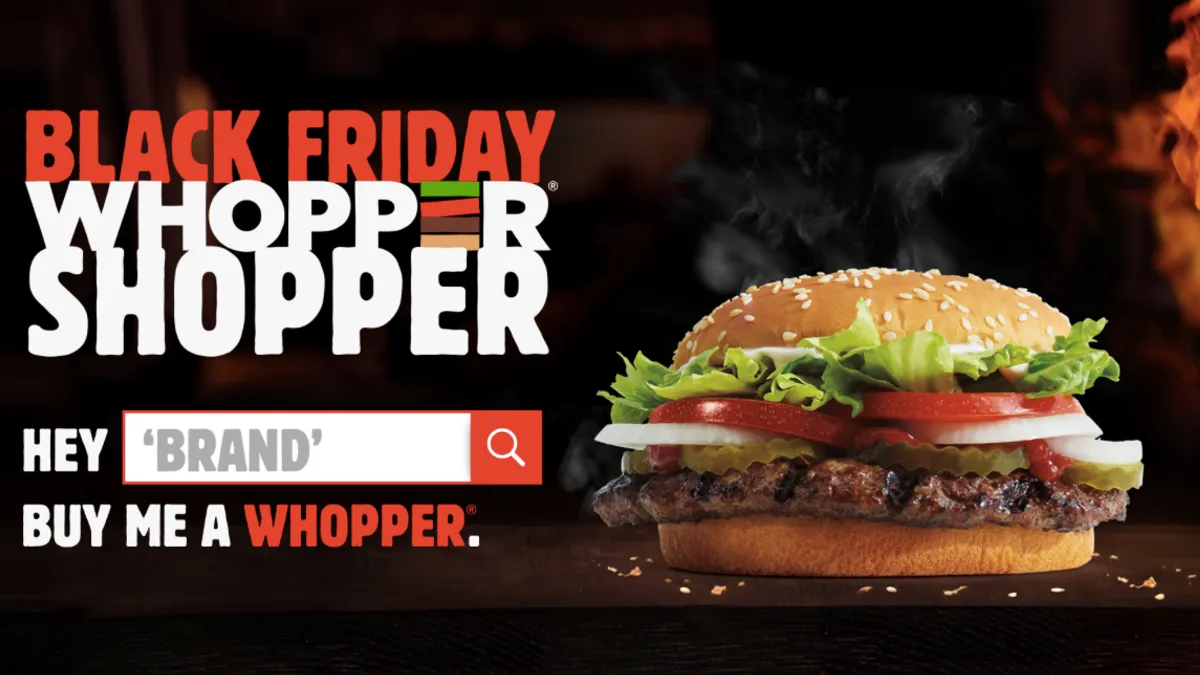Dive Brief:
- Burger King is "hijacking" Black Friday shopping by making other brands buy consumers a Whopper, according to a news release.
- The fast food chain launched Whopper-Shopper.com, a site that features online banner ads from other brands including Walmart, Diesel, Macy's and Tommy Hilfiger. Shoppers can create an account at the site, and when they click on a banner ad and make a purchase, the owner of the site, in this case Burger King, gets a percentage of the sale. Burger King is giving the money made from ad clicks back to consumers in the form of vouchers for Whoppers.
- Whopper-Shopper.com is live now through Cyber Monday, Nov. 26. There's a limit of three Whopper vouchers per participant, and vouchers, distributed as $5 Burger King gift cards, will be sent soon after the promotion ends.
Dive Insight:
In its latest marketing stunt, Burger King is hijacking other brands' Black Friday digital marketing campaigns by leveraging the affiliate marketing model, an area where spending is expected grow from $5.9 billion this year to $6.8 billion by 2020. Consumers are probably not aware of affiliate marketing, which pays a commission to websites that generate traffic and sales via links, but many are distrustful of advertising. Pulling back the curtain on a not-widely-understood area of digital marketing could lend an air of authenticity to the Burger King's campaign. At the same time, turning over the commissions Burger King earns to shoppers is likely to generate goodwill.
Offering free Whoppers for shopping via Whopper-Shopper.com could be a draw for holiday shoppers who are also Burger King fans, as 57% of consumers plan to shop online via their computers this holiday season and 42% via mobile, according to Citi Retail Services.
Burger King continues to debut clever marketing campaigns that highlight injustices, skirt the rules and capitalize on other brands' marketing efforts in unique ways, a strategy the brand refers to as "hackvertising." Last year's "Google Home of the Whopper" TV ad earned the brand an estimated $135 million in earned media by triggering the built-in Google Assistant on any Home device that heard the ad to read the Whopper's Wikipedia entry.
Burger King also parodied artificial intelligence, an increasingly popular marketing tactic, with a campaign created by an "agency of robots," and hid Whoppers in popcorn boxes in Peru to help moviegoers get around laws prohibiting them from bringing their own snacks into cinemas. The brand also used quirky marketing stunts to highlight the issue of net neutrality and to explain the "pink tax," which refers to products marketed to women that usually cost more.
The fast food marketing is growing increasingly competitive, and brands, like Burger King, are turning to stunts to set themselves apart and build brand loyalty with Gen Zers, who are more likely to visit fast-food restaurants than older generations.












